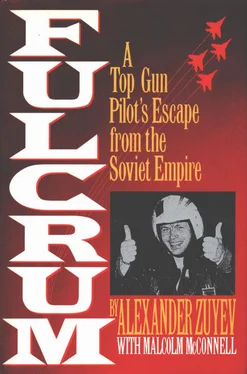I did not want to drop my tank with eighteen hundred pounds of jet fuel into that village. As soon as I was certain my momentum would carry the tank beyond those houses into the empty swamp ahead, I groped on the stick for the tank-drop switch. It was protected by a safety cover, which in turn was secured by a wire. I had never dropped one of these expensive tanks before, and my fingers felt unusually clumsy. Then I snapped it open and the airplane reared up wildly, again threatening a stall. Still on afterburner, the sudden loss of the tank’s mass was almost disastrous. I thrust the stick forward to “parry the moment,” putting all those years of theoretical aerodynamics to practical purpose. Then, with my right hand numb as ice, I cupped the stick and used my left hand to pull the throttles back, first to military power, then down the rails to ninety-four percent.
I snatched back the stick and centered it, slamming the plane violently level. Lieutenant Tveretin would not have approved; this was not precision flying. Although I had a feeling he and thousands of other dedicated Soviet pilots would applaud my actions secretly. I glanced over each shoulder at the ground below. Six thousand feet altitude. It was time to begin the attack.
I rolled the stick left and banked forty-five degrees, then swung the stick onto my left thigh to continue rolling hard past ninety degrees. The snowy line of mountains tilted. And my windscreen filled with the green valley swinging smoothly past the nose. The sheet-metal roofs of the village tilted toward me, then the highway, and finally the rusty wire fence of the air base perimeter. I centered the stick, then eased it forward to align the nose with the long gray runway.
The base was still in shadow, and wisps of mist hung over the line of parked aircraft on the squadron aprons. I tripped the gun-arm switch on the top of the stick and my head-up display glowed with the pale green funnel of the cannon sight. I selected the malaiya “small” target size. A glowing “M” appeared at the left of the HUD. But I immediately saw my dive angle was too shallow to properly sweep the entire line of aircraft. So, like a raw kursant, I punched the stick forward to pitch down the nose. For a moment I rose in the seat with negative G, only to slam down hard again. That maneuver certainly would displease Lieutenant Tveretin.
But I had the aircraft lined up right in the middle of the sight funnel. The line of gray MiGs swooped into sharp focus. Two long bursts would be necessary to use the full magazine of 150 rounds. I eased the stick right to correct my aim, then squeezed the cannon trigger. Nothing. I verified the PTO panel. The weapons system switch was still on. I had to have a live gun because the HUD sight was illuminated with the proper symbology. I squeezed again. Silence, instead of the harsh rattle of the cannon.
The runway was rising fast now. I was below 1,500 feet. I clenched my teeth. Somehow the bastards in the Osobii Otdel had installed a new inhibitor on the cannon. I had no functioning weapons, no way to defend myself.
Easing the stick back, I leveled at 600 feet, then dropped even lower. The squadron parking aprons swept past in a blur. Ahead I saw men running frantically around the three remaining fighters on the duty-alert apron. The apron floated toward me. The standby magnetic compass swung to 240 degrees. At least I was now on the proper heading for Trabzon. But I had failed in my attempt to avenge the dead of Tbilisi. It was time to leave. Sweeping past the control tower, I rocked my wings back and forth, a farewell to any friends below.
Then I slid the throttles ahead to military power and gingerly eased the stick forward, dropping down to less than 100 feet. The flat orange groves below seemed almost chartreuse in the early morning sunshine. Off to the right, the straight line of the Tskhakaya-Poti highway and rail line cut across the flats of the Rioni valley. I was too low to see the coast ahead. But I knew it was coming up fast. The meandering brown river snapped past and I was beyond any villages. Now I banked the nose south, onto a new heading of 225 magnetic.
Even without the airspeed indicator, I knew my speed had stabilized at .95 Mach, 630 knots, at this extremely low altitude. I had never flown so fast so low. Solid objects on the ground seemed to suddenly liquefy and spray past in a blur of colors as I approached them. But I had to stay down here at least another three minutes. The distant rank of high-tension power lines to the northeast marked Poti East airfield, the site of the PVO missile brigade guarding the Navy base. I knew their improved models of V-75 Dvina missiles were deadly within a kill circle ranging horizontally from three to fifteen miles and vertically right down to 900 feet.
By keeping the fighter at least nine miles from their acquisition radars and at ninety feet altitude, I was probably out of danger. But if the alarm had already been passed to that PVO brigade and they had low-altitude missiles of the modified Romb or Kube class deployed on mobile BRT launch vehicles, I was in trouble. The countermeasure system of this particular fighter was loaded with aluminum-foil chaff bundles, not flares. Chaff was good masking protection from radar-guided missiles, not the infrared-seeking warheads of the mobile launchers.
The horizon ahead shimmered strangely. For a terrible moment I thought that weird glow was a flash of a missile launch. Then I saw it was the reflection of the first direct sun on the marshy Paleostomi Lake southeast of Poti. I rolled further left. There were thousands of terns and migrating thrushes in those marshes. At this speed, a bird strike, even with a tiny sparrow, could shatter the canopy and kill me. But I could not risk climbing higher until I cleared the coast.
I glanced away from the windscreen to verify my remaining fuel. Still 5,500 pounds, enough to make Trabzon, if I didn’t have to take violent evasive action. When I looked up, a huge black fence filled the horizon. Instinctively I hauled back on the stick and bounced up to 300 feet. Just in time to clear a double row of drooping high-tension power lines.
I had not realized I was already this far. Those power lines turned south toward Batumi only two miles from the coast itself. Then the entire horizon winked and rippled with the grapey blue of the Black Sea at dawn. The narrow coast road and tan beach sailed by. I was free of the land.
But, stupidly, I hung here too long. The SPO-15 radar-warning receiver display in the right corner of my panel suddenly twinkled like the lights on a tree. I was being swept by the acquisition radar of a missile system. The outer circular row of yellow priority lights blinked in the upper right quadrant, marking first ten degrees, then thirty, then back to ten. That radar beam held me steady for a moment, possibly long enough for launch acquisition. Then three of the nine green bearing lights winked on, indicating that the sweep angle of the beam had narrowed. A moment later the inner row of yellow oblong power lights pulsed. The search and acquisition had narrowed and intensified. That had to be the PVO brigade in Poti.
Without hesitating, I pushed the stick hard forward, steadied it with my numb right fist, and tripped the chaff dispenser switch at the lower center of my instrument panel, flipping to manual control. The chaff dispenser in the boat tail between the two engine exhausts was now popping chaff packets every 1.5 seconds. These packets instantly shredded in the transonic slipstream, bursting into wide clouds of hair-thin aluminum dipoles. Within seconds, I knew the chaff target would swell on the PVO radar screens into a ragged oval, masking my descent toward the waves.
My radar-warning panel went dark. Luckily I had not been wearing earphones so I had not heard the nagging beep of an imminent lock-on.
Читать дальше










